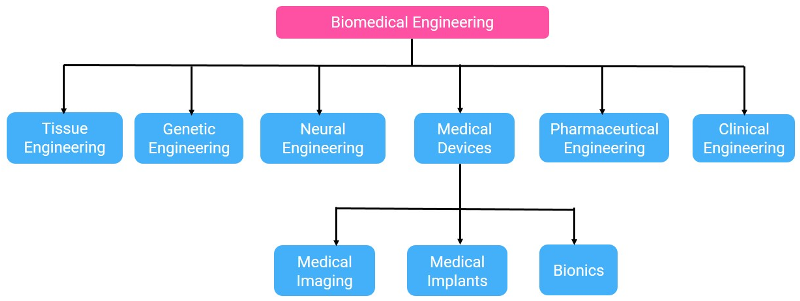

Due to elevation in medical technologies, there is great demand for Biomedical Engineers in India and abroad. Biomedical Engineers are responsible for developing artificial limbs, prosthetics, imagining machines like MRIs, ECGs; thus enhancing healthcare quality. Biomedical engineering (BME) is applying engineering principles and the concept of design to medicine to revolutionize health care treatment.
| Course | Eligibility | Duration |
|---|---|---|
| Under Graduate | Class 10+2(Science stream with PCMB)* | 2 years |
| Post Graduate | Graduate(Biomedical engineering stream preferable) | 2 years |
| Ph.D.(For those who want to go in academics) | Post Graduate(Biomedical engineering stream) | 3 - 5 years |
* Physics and Mathes as compulsory subjects and one from Chemistry/Biology/Biotechnology
J.E.E. or Joint Entrance Exam
GATE(Graduate Aptitute Test in Engineering)
Depending on the type of institute/quota, fees can range from INR Fifty thousand to Two lakhs per year excluding lodging and boarding.
Judgment and decision making
Analytical Thinking
Computer knowledge and high-level software development skills
Good communication skill
Creativity and Innovation
Excellent hand-eye coordination
A biomedical engineer can choose from a variety of career options specifically designed as per the interest of the engineer. :

Tissue Engineering :One of the goals of tissue engineering is to create artificial organs (via biological material) for patients that need organ transplants.
Genetic Engineering :Genetic engineers add new traits to organisms by manually adding new DNA to the organism. Desired traits or quality can be acquired in organisms or plants through genetic engineering.
Neural Engineering :Neural Engineers use engineering techniques to understand, repair, replace, or enhance neural systems.
Medical Devices :Biomedical engineers are responsible for making following medical devices.
Medical Imaging:For the diagnosis and treatment of disease biomedical engineers prepare devices that create visual representation of the interior body like MRI, Ultrasound and endoscopy.
Medical Implants :Biomedical engineers develop implants kind of medical device made to replace and act as a missing biological structure.
Bionics :Bionics does artificial body part replacement.
Pharmaceutical Engineering :Pharmaceutical Engineers conceive, develop and test new drugs; improve exciting drugs.
Clinical Engineering :Clinical engineers design, develop and maintain the equipment used for diagnosing illness and treating patients.
Biomedical Engineering
Biomedical Instrumentation
Biotechnology & Biochemical Engineering
Biomedical Genetics
Biomedical Engineering
Biochemical Engineering & Biotechnology
Biomedical Signal Processing & Instrumentation
Biomedical Instrumentation
Government Engineering College, Gandhinagar (http://www.gecgh.cteguj.in )
LD College of Engineering, Ahmedabad (http://ldce.ac.in )
Parul University, Vadodara (https://www.paruluniversity.ac.in )
Ganpat University, Mehsana (https://www.ganpatuniversity.ac.in )
Thadomal Shahani Engineering College, Mumbai (http://www.tsec.edu )
Dwarka J Sanghvi College of Engineering, Mumbai (http://djsce.ac.in )
Indian Institute of Technology, Mumbai (http://www.iitb.ac.in )
Vidyalankar Institute of Technology, Mumbai (http://www.vit.edu.in )
Vellore Institute of Technology (VIT), Vellore (http://www.vit.ac.in )
KLE Dr. M S Sheshgiri College of Engineering and Technology, Belgaum (http://www.klescet.ac.in )
International Center for Applied Sciences, Manipal (http://manipal.edu/icas.html )
Guru Jambheshwar University of Science and Technology, Hisar (http://www.gjust.ac.in )
Rajiv Gandhi Institute of Technology - Bangalore, R.T. Nagar, Bangalore (https://www.rgit.ac.in )
Bayer Health Care-Diagnostics
Nicholas Piramal India Ltd.
Ranbaxy Diagnostics
Siemens
Larsen & Toubro
Cipla
Johnson & Johnson
GE Healthcare
Note:
All the students, teachers and guardians should note that the above mentioned websites and information on various colleges / universities may change under the rules and regulations of the education department.